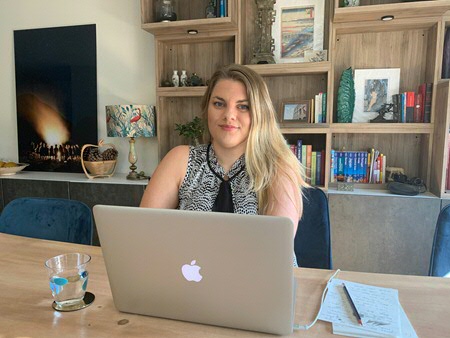'Not enough cycling, colleagues and coffee breaks'
The experimental research conducted at the Faculty of Science and Engineering was brought to an abrupt halt when a pandemic entered our country without politely knocking on the door. However, no crisis is strong enough to stop scientists from doing science. How are they managing this? PhD student Melanie König shares her experiences with us.
Working as a scientist without ever setting foot in the lab? It isn’t impossible. Second-year PhD student Melanie König (29) does not rely on oscilloscopes, conical flasks or pipets to do science. Her main tool is her computer.
König is part of the Molecular Dynamics group. Scientists in this research unit study the interaction between different atoms and molecules through computer simulations. König is also part of the BaSyC consortium, which is a national research programme aimed at building an artificial cell. She explains: ‘Within BaSyC, I am mainly focussed on cell division. How does one living cell manage to become two living cells?’

Being a theoretical scientist is very useful in times of virus outbreaks. König can access all the systems that she needs from home, which allows her to continue her research at an almost normal pace. ‘I feel very lucky. I had already established a connection between my home computer and the super-fast computer cluster that I used at work when I first started my job. Some of the simulations that I do take days or even weeks to run. I need to be able to check on them outside office hours to make sure that there are no issues or crashes. Also, using the University’s computer clusters and national supercomputers only takes one or two additional commands when accessing them from home.’
Even though working from home is easier for König than for most PhD students, she would really like everything to go back to normal soon. ‘I find it hard to manage my working hours from home. Sometimes I work more hours then I should, sometimes less. I do not really keep track of it, but it leaves me feeling pressured. Am I achieving enough? This is definitely a lot easier for me when I’m actually situated at my office.’
Being a people person, König also struggles with being alone all day: ‘I really miss the social part of my job, from work meetings to coffee breaks. Usually, I can just walk to the office next door if I need some input or some small talk. These moments with co-workers can really brighten your day.’ Fortunately, she has been able to meet some of her colleagues for a walk in the park from time to time. She grins: ‘I am not a person who likes to go for runs or anything, so taking walks with colleagues is a good way to stay healthy. I was even missing the exercise of cycling to work every day.’
Luckily, König and her colleagues have recently also been able to meet in their natural habitat once again since working in the office in shifts is now permitted. ‘It feels great to be back, even though I’m still mostly at home. Hopefully, I will soon be able to cycle to work again every day.’
Are you interested in learning more about König’s work? She and her colleagues have recently published a paper in Nature Communications. You can also check the Science LinX news article on this topic.
Text: Kaila Ronde
| Last modified: | 01 June 2021 4.15 p.m. |
More news
-
13 May 2024
Trapping molecules
In his laboratory, physicist Steven Hoekstra is building an experimental set-up made of two parts: one that produces barium fluoride molecules, and a second part that traps the molecules and brings them to an almost complete standstill so they can...
-
29 April 2024
Tactile sensors
Every two weeks, UG Makers puts the spotlight on a researcher who has created something tangible, ranging from homemade measuring equipment for academic research to small or larger products that can change our daily lives. That is how UG...
-
16 April 2024
UG signs Barcelona Declaration on Open Research Information
In a significant stride toward advancing responsible research assessment and open science, the University of Groningen has officially signed the Barcelona Declaration on Open Research Information.

